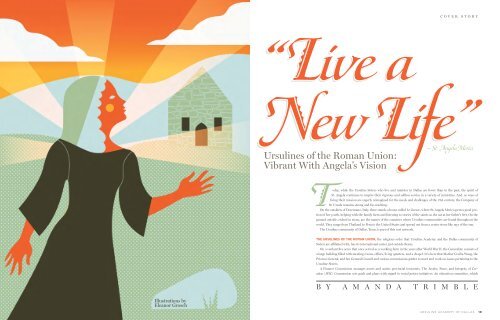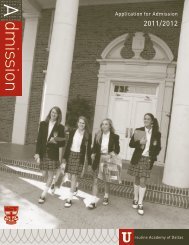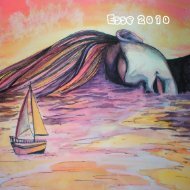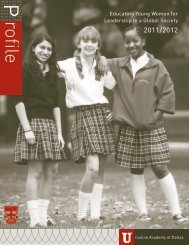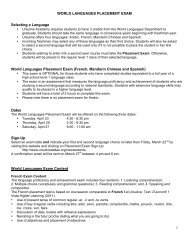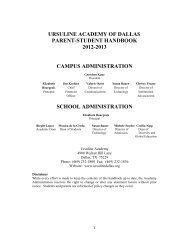You also want an ePaper? Increase the reach of your titles
YUMPU automatically turns print PDFs into web optimized ePapers that Google loves.
ROMAN UNION URSULINES AROUND THE WORLDAMERICASU. S. A.MEXICOProvince Countries SistersBrazil 91Caribbean Barbados, 19Guyana,VenezuelaMexico 29Peru/Chile 25USA 279(includesCentral, East,Northeast, andWest provinces)PERUCHILEVENEZUELABARBADOSGUYANABRAZILSENEGALNETH.U. K.POLANDBELGIUMCZECHSLOVAKIA UKRAINEFRANCE AUSTRIAHUNGARYSLOVENIA ROMANIACROATIA BOSNIA-HERZEGOVINASPAINITALYGREECECAMEROONAFRICAProvince Countries SistersCameroon 8Senegal 12Southern South 23Africa Africa,BotswanaBOTSWANASOUTH AFRICAEUROPEProvince Countries SistersAustria 32Croatia Croatia, 66Bosnia-HerzegovinaCzecho- 30MoraviaEngland 50France/ 218Belgium/SpainGeneralate (Rome) 19Greece 7Hungary- 15RomaniaItaly 87Netherlands 54Poland Poland, 326UkraineSlovakia 74Slovenia 57TAIWANTHAILANDPHILIPPINESI N D O N E S I AEAST TIMORAUSTRALIAASIA AND AUSTRALIAThe <strong>Dallas</strong> community <strong>of</strong> <strong>Ursuline</strong> Sisters:(standing, left to right) Sisters Jill Jaeb, MaryTroy ’51, Margaret Ann Moser ’56, AnnMangelsdorf, and Peggy Hill ’53; (seated, left toright) Sisters Louis Marie Carter, Lois Castillon(Prioress), and Nancy Fearon. Not pictured:Sisters Madeline Kelly and Emilia Villarreal<strong>Ursuline</strong> <strong>Dallas</strong>’ Director <strong>of</strong> Mission and HeritageSister Lois Castillon served on, worked fora time to gather and edit source documents on<strong>Ursuline</strong> education from around the world.In addition to these Sisters in Rome, there areclose to 2,000 Roman Union <strong>Ursuline</strong>s in 36countries who carry on St. Angela’s mission <strong>of</strong> presenceand service for God’s people in multiple ways.It is estimated that there are approximately8,000 <strong>Ursuline</strong> Sisters worldwide, belonging toindependent congregations and different unions.Although these numbers are smaller now thanin the past, there is still growth in areas aroundthe world, including eastern european provincesin Poland, Slovenia, and Slovakia, and in LatinAmerican countries such as Mexico and Brazil.In 2003, the Roman Union’s JPIC Commissionreceived its first charter and members. Thegoal was to encourage the <strong>Ursuline</strong> Sisters to livejustice, peace, and integrity <strong>of</strong> creation in theireveryday lives and to give consideration to thesecauses wherever they call home.To that end, Sisters from a variety <strong>of</strong> geographicregions were nominated and selected whoData courtesy <strong>of</strong> the <strong>Ursuline</strong>s <strong>of</strong> the Roman Union website.To learn <strong>more</strong>, visit www.ursulines-ur.org.“We asked ourselves, what arethings that we can do to fosterpeople’s awareness, and howcan we act?”— Sister Mary Ann Dooling, O.S.U.JPIC Commission MemberSt. Louis, Mo.would be well-suited to serve on the commission— that is, to have a knowledge <strong>of</strong> and commitmentto social justice causes, the ability to traveland work with different cultures, familiarity withtechnology and access to email, and possessingcreativity and an awareness that “things take timeand patience.”The group meets annually in Rome to discussprogress on its current initiatives. Members thenreturn home to report to the provinces.“each <strong>of</strong> us has a responsibility for culturegroups that we’re in contact with,” said SisterMary Ann Dooling, the representative to theProvince Countries SistersAustralia 61China Taiwan, R.O.C. 41Indonesia Indonesia, 259Philippines,East TimorThailand 39JPIC Commission for the United States, england,Australia, and other english-speakingregions, and a theology teacher at <strong>Ursuline</strong> <strong>Academy</strong>in St. Louis, Mo. “So, I’m the connector. Ikeep all the provinces up-to-date with what we’redoing and why.”afTer The lasT General chaPTer <strong>of</strong> Theroman Union in 2007, two initiatives were setforth for the JPIC Commission to focus on forthe coming years: awareness <strong>of</strong> human traffickingand access to water.“We asked ourselves, what are things that wecan do to foster people’s awareness, and how canwe act?” Sister Mary Ann said. “We emphasizedtrafficking at first, and now we’ve pushed the waterproject in the last couple <strong>of</strong> years.”The water project, or Project Africa as it hascome to be known, has been a great success thusfar for the Commission and the Sisters in Africa,who are directing resources into villages whereaccess to water is a challenge.In Cameroon, the aim was to dig a well toprovide clean water in the village <strong>of</strong> ngaoundéréSister Frances Boston works with one <strong>of</strong> the women <strong>of</strong> Sefhare, Botswana, who has benefitted fromthe installation <strong>of</strong> a water tap in her yard.(cost: €3,050). In Senegal, the goal was to provideclean water to the <strong>Ursuline</strong> clinic in Léhar(cost: €8,353). And in Sefhare, Botswana, thevillage that <strong>Ursuline</strong> <strong>Dallas</strong> students raised fundsfor during Lent last spring, the goal was to installtaps to provide better access to water for a group<strong>of</strong> women and children (cost: €6,556).Sister Frances Boston is the <strong>Ursuline</strong> Sisterwho is directing the water taps project in Sefhare.The goal <strong>of</strong> paying for 13 new water taps has beenachieved, but only six had been installed as <strong>of</strong> lastsummer.“They need a special machine to dig the trenchto the mainline, as these homes are on the farend <strong>of</strong> the village,” explained Sister Frances. “SoI make a weekly trip to Water Utilities to pushthem to complete the task.” In november, SisterFrances reported that the last <strong>of</strong> the taps had finallybeen installed.The next part <strong>of</strong> the project was the installation<strong>of</strong> tanks to collect rainwater to be used to growvegetables and fruit trees. Starting in August, theinstallation <strong>of</strong> the 2,500-liter water tanks beganin the yards <strong>of</strong> seven women gardeners.“I work with these women on a permacultureproject, where each one has a small home garden,”she said. “Any produce over what they needto feed their families, they can sell to supplementtheir income. The water tanks are needed, as <strong>of</strong>tenthe village water supply can be turned <strong>of</strong>f fordays at a time, and this is difficult and sometimes“Water is either carried in abucket on the head or in containerspushed in a wheelbarrow.The original 13 families… are led by single mothers,mainly unemployed withchildren, and most are HIVpositive. A water tap in theiryard can change their lives.”— Sister Frances Boston, O.S.U.Sefhare, Botswanadisastrous for the gardens.”Due to enthusiastic response in the early stages<strong>of</strong> Project Africa, each <strong>of</strong> the Sisters has reachedtheir goal and is establishing phase two plans forfundraising. Sister Frances has already registeredanother group <strong>of</strong> women to receive water taps,and now has plans to add an additional group inthe spring.“Our Sisters were so good in that they didn'tjust say, ‘We need water for this whole village,’ ”said Sister Mary Ann. “They said, ‘Can we getwater in just 10 households?’ And because now20 URSULINE ACADEMY OF DALLAS URSULINE ACADEMY OF DALLAS 21
“We have collected maybe 600pounds <strong>of</strong> bottles so far … Theygive us very little money for it,but we’re not doing it for themoney. It’s for the love <strong>of</strong> theenvironment and to spreadawareness.”— Sister Shelly JhetooJPIC Commission MemberGeorgetown, Guyanathey have the funding for that, they can expand to<strong>more</strong>. They’ve been very thoughtful about doingthings in pieces that are manageable.”Even small projects are making big impacts.“In Sefhare, a large majority <strong>of</strong> the people stillhave to go to the general village pump to drawwater for their daily needs,” said Sister Frances.“The water is either carried in a bucket on thehead or in containers pushed in a wheelbarrow.The original 13 families I identified to assist areled by single mothers, mainly unemployed withchildren, and most are HIV positive. A water tapin their yard can change their lives.”To help fund Project Africa, <strong>Ursuline</strong><strong>Academy</strong> <strong>of</strong> <strong>Dallas</strong> has been joined by <strong>Ursuline</strong>schools and other <strong>Ursuline</strong> communities aroundthe world, one <strong>of</strong> which is Marian <strong>Academy</strong> inGeorgetown, Guyana.At this school, Sister Shelly Jhetoo works toeducate students on environmental issues while(Clockwise, from top left) The children <strong>of</strong> Marian <strong>Academy</strong> in Georgetown, Guyana, raise fundsfor Project Africa. Sister Claudine-Marie Ndione, an <strong>Ursuline</strong> Sister from Senegal. The JPIC Commission:(from left) Sisters Veronica Andayani, Mary Ann Dooling, Alice Montgomery, Shelly Jhetoo,Paola Scarpin, Maria Teresa de Llano, and Leocadie Gody Cissokho, attend the annual meeting atthe Generalate.also teaching religious education and remedialreading. During Lent last spring, they decorateda box with stickers and the words, “Water is a giftfrom God — Water is life!” and set to filling itwith funds.“We told the children that during Lent, you canmake a sacrifice,” said Sister Shelly. “Instead <strong>of</strong> goingto buy something sweet, they could just giveit up for that day and put the money in the box.”By the time Lent had ended, the box containedapproximately $1,200. “That’s a lot for Guyanabecause we are not a rich country, and it cameout <strong>of</strong> the children’s own pocket money. But theywere very enthusiastic about the project.”Sister Shelly is also a member <strong>of</strong> the JPICCommission, representing the Caribbean Province,and works on a vocation commission inGeorgetown. She was 23 when she entered intothe sisterhood 16 years ago. But her vocationwas not always a clear-cut answer to her. Despitebeing heavily involved with her church and agrowing desire to help others, she was not surewhere the devotion to her faith was taking her.“Once after Mass when I was young, one <strong>of</strong> theMissionary <strong>of</strong> Charity Sisters asked me, ‘Wouldyou like to be a Sister?’ And my answer was a firm‘no,’ ” recalled Sister Shelly. “It took me many yearsbefore I began to wonder, ‘Is it possible that Godis inviting me to a religious vocation?’ ”After 13 years away from Guyana, during“When I see girls growing upin wisdom and successfully, itgives me great joy.”— Sister Claudine-Marie Ndione, O.S.U.Thiès, Senegalwhich time she became an <strong>Ursuline</strong> Sister, shereturned in 2010 and began her work at Marian<strong>Academy</strong>. Almost immediately, she saw ways toincorporate her passion for the environment andrespect for creation at the school.“When I came back to Guyana, I saw all theseplastic bottles thrown on the street and collecting indrains, and I was a bit taken by it,” said Sister Shelly.After some research, she found a company thatwould come collect plastic bottles from the schoolfor recycling, installed a special container in thecafeteria, and began encouraging the students toadd their water bottles to it.“We have collected maybe 600 pounds <strong>of</strong> bottlesso far,” she said. “They give us very little moneyfor it, but we’re not doing it for the money. It’s forthe love <strong>of</strong> the environment and to spread awareness.That’s why we are doing it.”Sister Patrice Clifford, a graduate <strong>of</strong> <strong>Ursuline</strong>New Orleans, lives in Cameroon.Protection <strong>of</strong> the environment, theavailability <strong>of</strong> education, and respect for all livingcreatures drives <strong>Ursuline</strong> Sisters around theworld to continue St. Angela’s work in many differentand <strong>of</strong>ten pr<strong>of</strong>ound ways.Sister Patrice Clifford, a graduate <strong>of</strong> <strong>Ursuline</strong><strong>Academy</strong> in New Orleans, moved to Cameroon28 years ago to help found a new <strong>Ursuline</strong> communitythere and has never left.She teaches English to French-speaking Cameroonians.For 20 years she taught at a diocesansecondary school, and now she teaches groups <strong>of</strong>young men preparing to enter seminary school.The women in the <strong>Ursuline</strong> community there includefour Cameroonian <strong>Ursuline</strong>s, the youngest<strong>of</strong> whom made her first pr<strong>of</strong>ession in September.“One <strong>of</strong> the really special graces <strong>of</strong> my yearsin N'Gaoundéré has been the day-to-day contactwith my Muslim brothers and sisters,” said SisterPatrice, explaining that about one-third <strong>of</strong> thepopulation <strong>of</strong> Cameroon is Muslim, with the remainingpopulation split between Catholics andProtestants.“For a lot <strong>of</strong> them, this is their first contact witha Sister. These warm, friendly encounters mean agreat deal to me. I think that Angela, peacemakerpar excellence, would delight in being presenthere to strengthen bonds <strong>of</strong> peace through verysimple, daily encounters with God’s children <strong>of</strong>diverse religious backgrounds.”In Senegal, Sister Claudine-Marie Ndionebecame an <strong>Ursuline</strong> in 1995. Since then she hasspent some time as a principal <strong>of</strong> a secondaryschool for girls in Thiès, Senegal, and recently finishedher tertianship, a year <strong>of</strong> spiritual renewal,in Rome.“From the beginning, when I met the <strong>Ursuline</strong>Sisters, I was attracted to their life,” said SisterClaudine-Marie, who today is working with agroup <strong>of</strong> girls preparing to become <strong>Ursuline</strong> Sisters,while also helping to plan the 50th anniversaryfestivities <strong>of</strong> the foundation <strong>of</strong> the <strong>Ursuline</strong>community in Senegal.“I liked the way the Sisters help young girls becomefree from African traditions. In my country,girls do not have the same opportunities as boyswhen it comes to continuing their studies.“We especially try to help girls who come frompoor areas. I met a very special girl who had nothad a very healthy development — she lookedlike a small child, but she was already 12 yearsold. I helped her join our school, and now she ishappy to be an <strong>Ursuline</strong> student,” recalled SisterClaudine-Marie. “When I see girls growing up inwisdom and successfully, it gives me great joy.”In Brazil, Sister Helenice de Souza recentlycelebrated 25 years <strong>of</strong> being an <strong>Ursuline</strong> Sister. InRibeirão Preto, she is the principal <strong>of</strong> Colegio SantaUrsula, which is home to 1,550 students. Shedescribes how the Brazilian Province decided t<strong>of</strong>ocus its initiatives on environmental preservation.“When the Roman Union motivated us towork in the development <strong>of</strong> a project on a ‘culturefor peace,’ I felt I had to give my best to makepeace a part <strong>of</strong> the reality <strong>of</strong> wherever I could besent to work,” explained Sister Helenice.“But the Brazilian Province understood itwould be impossible to work for a peaceful soci-“Go out into deep water”Last October, all nine Sisters in the <strong>Dallas</strong> Community <strong>of</strong><strong>Ursuline</strong> Sisters traveled to White Plains, N.Y., for a U.S.Chapter meeting <strong>of</strong> <strong>Ursuline</strong>s <strong>of</strong> the Roman Union.With their theme, “Go out into deep water — Withcourage and hope, welcome the future!” (Luke 5:4),<strong>more</strong> than 170 <strong>Ursuline</strong>s from 12 states and <strong>more</strong> than 50communities gathered to pray, play, eat, talk, reflect, andmeet together in the spirit <strong>of</strong> St. Angela.Every six years, similar chapter meetings <strong>of</strong> RomanUnion <strong>Ursuline</strong>s are held in regions around the world.The purpose is to plan and review ministries and local,national, and global issues.During the first two days <strong>of</strong> the White Plains meeting,the U.S. Sisters also met with lay collaborators fromacross the country for reflection and discussion. <strong>Ursuline</strong><strong>Academy</strong> Principal Elizabeth Bourgeois participated asone <strong>of</strong> these collaborators.Proposals from the U.S. Chapter meeting, includingthe selection <strong>of</strong> delegates to the September 2013 worldwideGeneral Chapter meeting, were sent to the <strong>Ursuline</strong>Global Leadership Team in Rome.To read Elizabeth Bourgeois’ reflection on the Chaptermeeting, visit www.ursulinedallas.org/ursulinesisters.ety without first considering our dependence on ahealthy environment, and so I strongly embracedthis cause.”Last September, a group from <strong>Ursuline</strong> <strong>Academy</strong><strong>of</strong> <strong>Dallas</strong>, led by Sister Lois Castillon andCecilia Nipp ’85, Director <strong>of</strong> Diversity and GlobalEducation, took three students to Brazil to participatein a cultural and educational exchangewith students at Colegio Santa Ursula and otherschools in Brazil. The students who made thetrip, members <strong>of</strong> <strong>Ursuline</strong>’s Permaculture AwarenessClub, shared what they were doing to furtherthe cause <strong>of</strong> environmental stewardship and sustainability.(<strong>Read</strong> <strong>more</strong> on page 8.)22 URSULINE ACADEMY OF DALLAS URSULINE ACADEMY OF DALLAS 23


